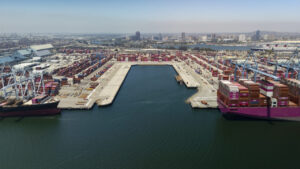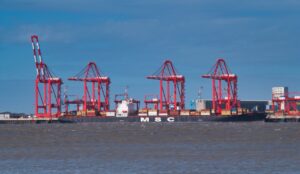Senior Vice President of Hyperloop One’s Global Operations, Nick Earle, has explained the effect that Hyperloop One, the global leader in developing the world’s first operational Hyperloop, will have on manufacturing, logistics, supply chain and warehousing in his keynote at the Global Manufacturing and Industrialisation Summit (GMIS) in Abu Dhabi.
Earle, who will also be the keynote speaker for the 'Beyond Moves Per Hour and Terminals of the Future' session at PTI's conference, said that benefits would include increased capital due to reducing finished goods inventories by 25%, access to 10 times larger talent pools with the same commute time and saving up to 80% on real estate costs, as well as shorter lead times, reduced freight spend and slashed CO2 emissions.
Terrific momentum has driven the project’s development, with new images recently revealing the progress made at the DevLoop, the world’s first and only full-scale Hyperloop test track.
Earle said: “As the only company in the world building an operational Hyperloop system, Hyperloop One is focused on creating a new mode of transportation to move people and cargo.
“Hyperloop One changes everything. We're committed to enabling disruption to create new opportunities in manufacturing, warehousing and supply chain distribution.
Hyperloop will drive significant value for a wide range of businesses and reinvent transportation as we know it.”
At two thirds the cost, three times the speed and with 3.5-4 times the benefit of high speed rail, Hyperloop will have a tangible impact on current and future businesses and society and Hyperloop One big plans for the Gulf Cooperation Council (GCC).
With a cargo transportation market worth approximately US$35 billion in 2016, according to McKinsey & Co, Hyperloop One has an addressable share of around $12 billion, excluding short-haul, intra-city shipping and low-value commodity freight such as oil and chemicals, metals and minerals and agriculture and food products.
It plans to compete for 100% of air freight in the GCC, which is a $7 billion market, 22% of the surface freight – which is approximately $3 billion in road and rail freight and 13% of the maritime freight, equating to roughly $2 billion.
Shervin Pishevar, Executive Chairman and Co-Founder of Hyperloop One, said: “The UAE has a progressive vision for transforming its economy, and Hyperloop One plays right into that by increasing access to the region and beyond.
“At Hyperloop One, we’re committed to enabling disruption, and we recognize the importance of partnership in being able to realize the full potential of developing robust ecosystems that are needed to support Hyperloop’s capacity.
“In this sense, we’re thinking beyond the benefits that Hyperloop will offer companies; connecting the GCC with Hyperloop will enable governments to address the region’s youth bulge, by providing young jobseekers with the opportunity to explore new, exciting job prospects. As an entrepreneur myself, I can understand the value of having an accessible ecosystem.”










